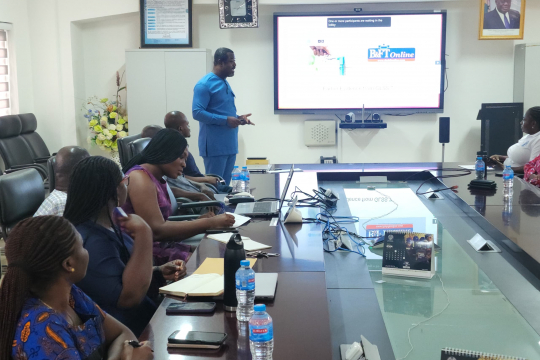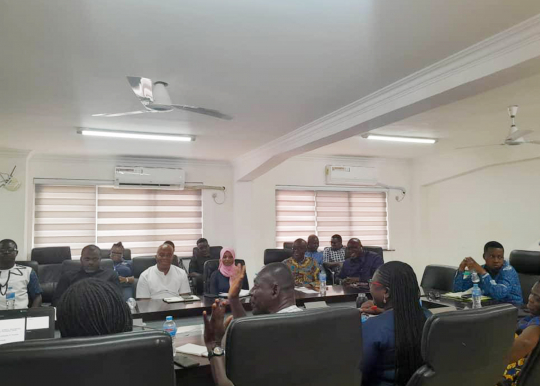EfD Ghana researcher Anthony Amoah recently led a discussion with managers and key Ghana Water Company Limited (GWCL) staff to tackle the pressing issue of water bill payment arrears. This meeting, a preparatory step for an upcoming experiment aimed at understanding and improving bill payment behaviors, was crucial for aligning research efforts and enhancing collaboration.
The engagement builds on a 2022 session where the research team presented findings from the Ghana Living Standards Survey 7, revealing that over 50 percent of customers do not pay their water bills. Now equipped with administrative data from GWCL, the research team aims to reinforce their earlier findings and underscore the importance of the current study.
"Our continued engagements with the Ghana Water Company stem from our belief in the vital role of continuous engagement and follow through in enhancing research impact. We hope today’s meeting will bring us closer to the objectives of research uptake, improved bill payment rates, and sustainable water supply in urban Ghana," said Anthony Amoah.
Impact of delayed payments on GWCL's sustainability
Anthony Amoah explained the theoretical basis of the experiment, which revolves around the "delayed effect" syndrome. According to this theory, delayed payments incur additional costs for GWCL, forcing the company into a debt cycle as it must borrow funds to sustain water supply operations. Addressing this issue is paramount for ensuring the long-term sustainability of GWCL.
The initial phase of the experiment, jointly designed with GWCL, will concentrate on the Accra East service region, with potential expansion to include data from Accra West for broader applicability of the findings. In Accra East, non-payment is defined as failing to meet the average expected bill amount within a month. Data indicates that approximately 48% of customers fall into this category, with around 60% of active billable customers not adhering to regular bill payments.
High usage and COVID-19 impact on water debt
Consumption trends further revealed that customers with higher water usage tend to accumulate substantial debts. Further analysis showed that the top 25% of consumers in terms of water usage have substantially higher debts, comprising about 79% of the total debt. In contrast, those with minimal usage typically had negligible debts.
Yearly data trends were also discussed, showing that the percentage of non-paying customers was 42% in both 2018 and 2019. However, during the COVID-19 pandemic, when the government provided free water, commercial consumer debt increased significantly. Post-pandemic, non-payment rates surged above the five-year average to around 45%, emphasizing the growing debt problem.
Promoting sustainable water services through research collaboration
This research initiative signifies a critical step towards ensuring the financial health and sustainability of Ghana Water Company Limited, and by extension, reliable water provision services to the people of Ghana.
“The continued interest of practitioners to engage with research is one of the most important elements needed to close the research-policy-implementation gap; this meeting with the leadership of GWCL is thus significant,” Anthony Amoah noted.
The meeting, held on May 10, 2024, at GWCL's head office, was attended by 31 staff members. It was part of the project Understanding and Improving Bill Payment in Ghana. The project team includes Anthony Amoah, Joe Cook, David Fuente, Rexform Asiamah, Kwame Adjei Mantey, Millicent Awuku, and Millicent Boatsi.
By: Vicentia Quartey

